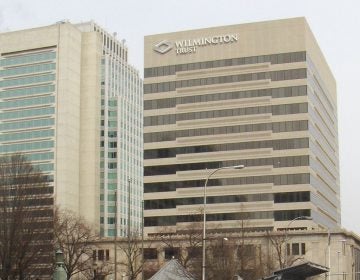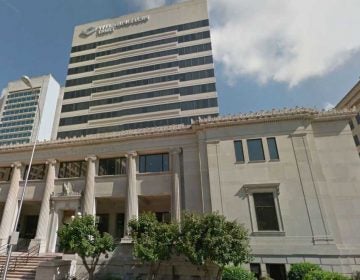Former Wilmington Trust loan officer testifies in fourth week of fraud trial
Four former executives are accused of hiding millions in bad loans on the bank's books from the Federal Reserve, the Securities and Exchange Commission, and the public.

Wilmington Trust (File photo)
A former Wilmington Trust loan officer, who in 2013 pleaded guilty to conspiracy to commit bank fraud, testified Monday against four former bank executives during the fourth week of their trial.
Joseph Terranova explained how he extended credit to clients without the knowledge of the bank’s loan committee. He also hid late and unpaid loans from federal bank examiners in order to maintain an attractive loan portfolio and to ensure developers’ projects continued during the economic crisis.
Robert Harra, David Gibson, William North, and Kevyn Rakowski are accused of hiding millions in bad loans on the bank’s books from the Federal Reserve, the Securities and Exchange Commission, and the public between October 2009 and November 2010.
Federal prosecutors claim the four schemed to hide the true volume of losses. By the end of 2009, the bank reported just $11 million in past due loans while waiving more than $360 million worth, prosecutors allege. They contend the bank never disclosed its financial circumstances to investors.
In October, Wilmington Trust reached a $60 million deal with the U.S. Attorney’s Office to settle criminal charges against it.
During his testimony Monday, Terranova said he was told of potential financial incentives if he grew commercial real estate portfolios by 10 percent annually.
To meet those goals, he secured loans for clients by unlawfully altering terms and circumventing the loan approval process.
Terranova also confirmed the bank’s strategy of waiving bad loans, including those as much as 390 days overdue, to prevent them from being reported as past due.
When the waiver practice was no longer sufficient, he testified, the bank created what prosecutors call a “mass extension process” of temporarily extending loans on a short-term basis, after executives pressured employees to “deal” with matured loans by a particular time frame.
Prior to Terranova’s testimony, former bank employee Barbara Marley took the witness stand and described the “Pennsylvania way” of handling loans, where employees “were more aware of the bank’s policies and more strictly stuck to those policies,” versus the “Delaware way,” where procedures were not necessarily according to the bank’s policies.”
WHYY is your source for fact-based, in-depth journalism and information. As a nonprofit organization, we rely on financial support from readers like you. Please give today.




